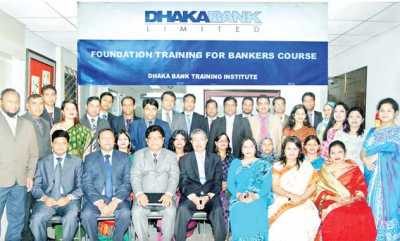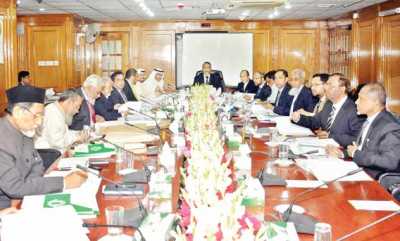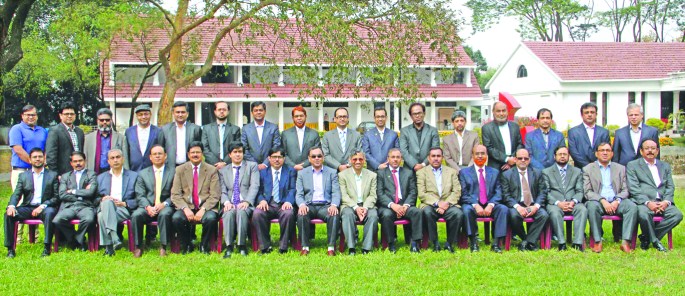Banking
Dhaka Bank holds training course

Dhaka Bank Limited organised a four-week-long Foundation Training course for its 42nd Batch officers at the bank’s training institute.
Some 29 officials from different branches, divisions, units of head office and DBL Securities took part in the training course started recently, said a press release.
IBBL recommends 10pc stock, 8pc cash dividends

The board of directors of Islami Bank Bangladesh Limited (IBBL) recommended 10 percent stock and 8 percent cash dividend for the shareholders for the year 2013, subject to approval of the 31st annual general meeting of the bank.
The decision was taken at a meeting of the board at Islami Bank Tower in Dhaka on Saturday, said a press release.
Prof. Abu Nasser Muhammad Abduz Zaher, Chairman of the bank, presided over the meeting.
Vice Chairman Engr. Mustafa Anwar, representative of the Public Institution for Social Security, Kuwait,
Executive Committee Chairman Engr. Eskander Ali Khan, representative of Al-Rajhi Co. for Ind. and Trade,
KSA, Directors Md Abul Hossain, representative of Investment Corporation of Bangladesh, Dr. Abdulhameed
Fouad Al-Khateeb, Representative of Arabsas Travel and Tourist Agency, KSA, Dr. Areef Suleman,
Representative of Islamic Development Bank, Mohammad Abdullah Al-Jalahma, Representative of Kuwait
Awqaf Public Foundation, Salahuddin Ahmed, Representative of Kuwait Finance House, Md. Abdus Salam, FCA,
FCS, Humayun Bokhteyar, ACPA, FCA, Professor NRM Borhan Uddin, Ph.D, Prof Dr. AKM Sadrul Islam, Barrister
Mohammad Belayet Hossain and Mohammad Abdul Mannan, Managing Director attended the meeting.
The meeting approved the profit and loss account of the bank for the year 2013 and balance sheet as on 31 December 2013.
BRAC Bank organizes leadership training for top bankers, CEOs of the industry

Dhaka : BRAC Bank has organized a leadership training for top executives of banks and CEOs of business organizations, reports in press release.
Senior bankers and CEOs of different companies took part in the management training titled ‘Transformational Leadership: Tapping into Your Personal DNA
Internationally renowned leadership and innovation trainer Dr. Prasad Kaipa conducted the three-day training at BRAC CDM at Rajendrapur in Gazipur. Mr. Syed Mahbubur Rahman, Managing Director & CEO, BRAC Bank, inaugurated the training participated by 32 top executives.
The training is aimed at capacity building of business leaders of Bangladesh by igniting genius within helping them for innovative and strategic decisions. This is the first time in banking industry that a leadership training was organized bringing in international trainer from abroad. It also helps in saving foreign currency for international training for top executives.
As economy grows, Bangladesh requires more business leaders who have expertise on global competition and modern management skills practiced worldwide. In view of this, BRAC Bank will organize such leadership and management training with renowned global resource persons not only for its top executives but also for other banks and industry leaders.
BRAC Bank is one of country’s fastest growing banks. With 157 branches, more than 350 ATMs, 400 SME Unit Offices and over 8,000 human resources, BRAC Bank operation now cuts across all segments and services in financial industry.
With more than 1.2 Million Customers, The bank has already proved to be the largest SME Financier in just 12 years of its operation in Bangladesh and continues to broaden its horizon into Retail, Corporate, SME, Probashi and other
arenas of banking. In 2013 BRAC Bank has received the prestigious ‘The Asian Banker Best Managed Bank in Bangladesh’. In the year: 2010, BRAC Bank has been recognized as Asia’s most Sustainable Bank in Emerging Markets by the Financial Times and IFC. The Bank is the country’s first founder member of Global Alliance
for Banking on Values (GABV) – a network of the world’ leading sustainable banks.
News:Bangladesh Today/23-Mar-2013BASIC Bank falls short of most targets
The central bank's attempts to steady the ship at BASIC Bank have been met with a huge setback after the troubled lender failed to meet the majority of the targets laid out in an agreement signed last July.
A high official of the central bank said the state-owned bank's reckless lending continued even after the signing of the agreement, which was drafted in after massive irregularities were unearthed.
The agreement obliged BASIC Bank to limit its single borrower exposure to 15 percent of the bank's total capital, but it overshot the ceiling for 61 of its clients, giving out Tk 2,111 crore more in loans than it should.
Bangladesh Bank stipulated that the state-owned scheduled bank raises its capital adequacy ratio (CAR) to 11 percent by the end of 2013. The CAR on December 31 last year stood at 4.5 percent.
It was also supposed to make up the capital shortfall of Tk 128.21 crore in 2013, but in reality, the capital deficit widened to Tk 647.38 crore by the end of December.
The state-owned scheduled bank also fell short in cash recovery last year: it was supposed to be a minimum of Tk 212 crore but BASIC Bank managed Tk 142.82 crore.
The troubled bank's non-performing loan ratio by the end of 2013 needed to be 5 percent, but it stood at 11.72 percent.
Another target was to transform the loss-making branches into profitable ones during the course of the year, which, again, it failed to. Of the total of 68 branches, 33 remain loss-making.
Bangladesh Bank also put a ceiling on BASIC Bank's loan growth in 2013: it was first set at 10 percent and later upon the bank's request it was extended to 20.63 percent.
Even then the state-owned scheduled bank fell short: its loan growth on December 31 last year stood at 25.26 percent.
Subsequently, the central bank as per the Bank Company Act 1991 enforced a penalty of Tk 10.02 crore.
BASIC Bank, however, maintains that its loan growth in 2013 stood at 18.5 percent, and has appealed for the withdrawal of the fine.
RAKUB should bring potential sectors under quality financing
RAJSHAHI: All the existing potential sectors and sub- sectors of agriculture should be brought under qualitative and quantitative investments for making the region’s agro-based economy more vibrant.
Services of Rajshahi Krishi Unnayan Bank (RAKUB) should be taken to the doorsteps of the farmers for elevating their living and livelihood condition, a RAKUB press release here said.
Members of the Board of Directors of the bank in its 408th meeting held at its board room on Thursday made these observations.
With Board Chairman Prof Dr Shah Newaz Ali in the chair, board members Mofazzal Hossain, Saifuddin Ahmed, Helaluddin Ahmed, Nurul Amin, Prof Modan Mohan Dey and Prof Obaidur Rahman Pramanik were present at the meeting.
For the sake of sustainable livelihood of the farmers and for bolstering the agro-based economy, the meeting called for increasing the need-based credit flow.
News:Daily Sun/22-Mar-2014



